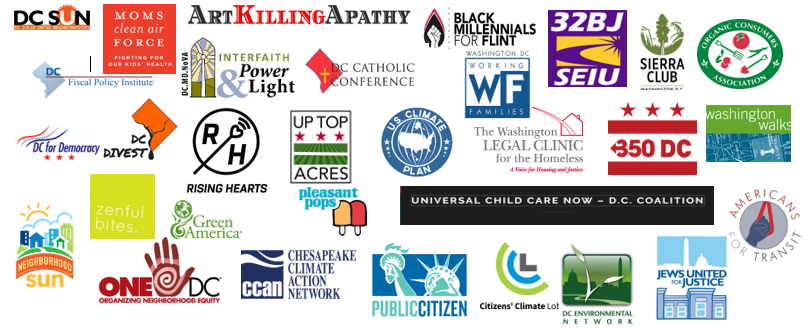Washington, D.C. is at the forefront of cities nationwide when it comes to promoting clean energy and tackling the climate crisis head-on. Now it’s time for D.C. to lead again—not only in cutting fossil fuel pollution but in creating a more just and sustainable economy for all.
That’s why, starting in 2015, we have been working with partners across the District to put a price on carbon. By making fossil fuel polluters pay for the real and damaging costs of their emissions, we can unleash the clean energy solutions we need, and protect household budgets in DC in the process.
Now we’ve proposed the Climate and Community Reinvestment Act of DC. It’s a bill that’s good for D.C families, ensuring that low-income and middle class residents prosper in the transition to clean energy. It would also mean less pollution wrecking our lungs and our atmosphere, more investment into energy efficiency solutions, and a faster transition to clean, renewable energy sources.
 know that putting a price on carbon is one of the most straightforward and cost-effective ways to fight climate change and spur more clean energy. Here’s how it could work in D.C.:
know that putting a price on carbon is one of the most straightforward and cost-effective ways to fight climate change and spur more clean energy. Here’s how it could work in D.C.:
 Starting on day one, nearly all of the money raised would be returned in equal amounts—through a monthly “rebate”—to every D.C. resident. This would put money directly into the pockets of D.C. families, ensuring that low-income and middle class residents are actuallyl better off in the transition to clean energy. The rebate would more than offset any rise in consumer prices for the vast majority of residents.
Starting on day one, nearly all of the money raised would be returned in equal amounts—through a monthly “rebate”—to every D.C. resident. This would put money directly into the pockets of D.C. families, ensuring that low-income and middle class residents are actuallyl better off in the transition to clean energy. The rebate would more than offset any rise in consumer prices for the vast majority of residents.
 committed to one of the boldest climate action goals in the county. By putting a price on carbon pollution and rebating nearly all proceeds back to District residents, the city could turn that goal into a reality and make D.C. the healthiest, greenest, and most livable city in the United States.
D.C. can be a trailblazer on the East Coast for progressive climate policy—sending a strong message to our national leaders on Capitol Hill—while ensuring D.C. families gain better health and economic security in the process.
And D.C. will join a growing movement of cities and states across North America. Boulder, Colorado enacted a carbon fee in 2006. The province of Alberta passed one last year. And carbon fee proposals are under consideration in statehouses from New York to Oregon.
committed to one of the boldest climate action goals in the county. By putting a price on carbon pollution and rebating nearly all proceeds back to District residents, the city could turn that goal into a reality and make D.C. the healthiest, greenest, and most livable city in the United States.
D.C. can be a trailblazer on the East Coast for progressive climate policy—sending a strong message to our national leaders on Capitol Hill—while ensuring D.C. families gain better health and economic security in the process.
And D.C. will join a growing movement of cities and states across North America. Boulder, Colorado enacted a carbon fee in 2006. The province of Alberta passed one last year. And carbon fee proposals are under consideration in statehouses from New York to Oregon.
 … and many more!
… and many more!
Click here for a downloadable factsheet.
See more and keep updated at our campaign website: www.carbonpricedc.org
How Would a Carbon Fee Work For D.C.?
We know that putting a price on carbon is one of the most straightforward and cost-effective ways to fight climate change and spur more clean energy. Here’s how it could work in D.C.:
know that putting a price on carbon is one of the most straightforward and cost-effective ways to fight climate change and spur more clean energy. Here’s how it could work in D.C.:
1) Make polluters pay:
Companies that buy and sell fossil fuels in the District would pay a fee on each ton of heat-trapping pollution they cause. The price, rising steadily over time, would reflect the damage these emissions inflict on our health, air and water, and climate.2) Rebate nearly 100% of the revenue to D.C. residents:
 Starting on day one, nearly all of the money raised would be returned in equal amounts—through a monthly “rebate”—to every D.C. resident. This would put money directly into the pockets of D.C. families, ensuring that low-income and middle class residents are actuallyl better off in the transition to clean energy. The rebate would more than offset any rise in consumer prices for the vast majority of residents.
Starting on day one, nearly all of the money raised would be returned in equal amounts—through a monthly “rebate”—to every D.C. resident. This would put money directly into the pockets of D.C. families, ensuring that low-income and middle class residents are actuallyl better off in the transition to clean energy. The rebate would more than offset any rise in consumer prices for the vast majority of residents.
3) Ensure cleaner air and a healthier economy:
A carbon fee will mean less carbon pollution wrecking our lungs and our atmosphere, more investment into energy efficiency solutions, and a faster transition to clean, renewable energy sources. D.C. families would benefit both economically and environmentally from cleaner air and water, new jobs created in energy efficiency and renewable energy, and carbon rebate funds flowing into family bank accounts.D.C. Can Lead the Way to a Just and Sustainable Economy
By pledging to slash greenhouse gas emissions 50% by 2032, D.C. has already committed to one of the boldest climate action goals in the county. By putting a price on carbon pollution and rebating nearly all proceeds back to District residents, the city could turn that goal into a reality and make D.C. the healthiest, greenest, and most livable city in the United States.
D.C. can be a trailblazer on the East Coast for progressive climate policy—sending a strong message to our national leaders on Capitol Hill—while ensuring D.C. families gain better health and economic security in the process.
And D.C. will join a growing movement of cities and states across North America. Boulder, Colorado enacted a carbon fee in 2006. The province of Alberta passed one last year. And carbon fee proposals are under consideration in statehouses from New York to Oregon.
committed to one of the boldest climate action goals in the county. By putting a price on carbon pollution and rebating nearly all proceeds back to District residents, the city could turn that goal into a reality and make D.C. the healthiest, greenest, and most livable city in the United States.
D.C. can be a trailblazer on the East Coast for progressive climate policy—sending a strong message to our national leaders on Capitol Hill—while ensuring D.C. families gain better health and economic security in the process.
And D.C. will join a growing movement of cities and states across North America. Boulder, Colorado enacted a carbon fee in 2006. The province of Alberta passed one last year. And carbon fee proposals are under consideration in statehouses from New York to Oregon.
Join us
For more information, and to get involved in building the campaign, contact Camila Thorndike, CCAN Action Fund’s Carbon Pricing Coordinator, at camila@chesapeakeclimate.org.Take Action!
Add your business to the growing D.C. Put A Price On It Coalition: Click here to join the coalition and to learn more about how your business can amplify the campaign. See more and keep updated at our campaign website: www.carbonpricedc.orgCoalition Partners
 … and many more!
… and many more!
Resources
- The Climate and Community Reinvestment Act of DC, Fact Sheet, February 2018.
- Coalition Letter in Support of a D.C. Carbon Fee and Rebate
- DC Carbon Fee-and-Rebate Policy: A Macroeconomic Analysis. Fact Sheet, July 2017.
- Put A Price On It DC Activist Toolkit. Volunteer Resource, Volunteer Resource, July 2017.
- D.C. Renewable Energy Programs for Businesses, CCAN Fact Sheet, January 2017.
- How to get a letter to the editor published in your local newspaper in support of a carbon fee-and-rebate policy, Volunteer Resource.
- D.C. Carbon Fee Sign-Up Sheet for Campaign Events, Volunteer Resource.
Key Articles
- “Thankfully, Virginia and D.C. are taking climate policy into their own hands,” The Washington Post, 5/29/17
- “D.C. coalition pushes innovative plan to cut emissions and protect most vulnerable residents,” ThinkProgress, 5/12/17
- “Climate Activists Propose D.C. Carbon Fee,” The GW Hatchet, 2/20/17
- “‘Put A Price On It D.C.’ Is Taking Off!,” CCAN, 5/03/17
- “Lobby training builds people’s political power for 2017 and beyond,” Citizens’ Climate, 1/03/17

